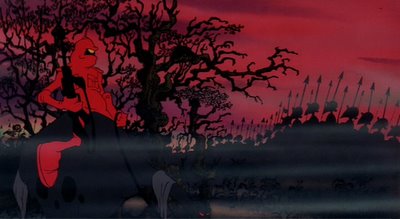Gary Gygax (1938 - 2008)
We are very sorry to hear about the death of one of the most influential artists of the late 20th century, game designer, Gary Gygax.
Gary Gygax created "Dungeons & Dragons" in the 1970's. This week when you turn on the tv, go to the movies, play video games, take a moment to pause and note that without Gary Gygax and the RPG juggernaut that he launched, your entertainments might look very, very different. There'd be fewer half-orcs, for one.
I reprint here, in full, a post from April 2006, called "No Neal. Gary Gygax Is Your Father":
Gary Gygax created "Dungeons & Dragons" in the 1970's. This week when you turn on the tv, go to the movies, play video games, take a moment to pause and note that without Gary Gygax and the RPG juggernaut that he launched, your entertainments might look very, very different. There'd be fewer half-orcs, for one.
I reprint here, in full, a post from April 2006, called "No Neal. Gary Gygax Is Your Father":
"No Neal. Gary Gygax Is Your Father"
...to which I replied:"No. That's not true. That's impossible!"And so then Gary Gygax said to me:"Search your feelings, Neal. You know it to be true."And then I squealed like a little piggy:"Noooo! Noooo! ..."And then coming to my senses:"... Oh, no. Wait. Yes! Yes! Of course! That explains a lot."Yes, Gary Gygax is my father.
Yet, he did not sleep with my mother - or so my parents insist. So how did this immaculate conception ("I.C.", for those who played on/against Catholic schools in high school sports teams) come to pass?"Star Wars" (1977) - not "Star Wars, Episode IV: A New Hope" (various years) - got a lot of us going, but if if I'm brutally honest, the greatest formative influence on my creative life - apart from Mad magazine - was probably Gary Gygax and his Advanced Dungeons & Dragons.
D&D was my baptism by fire into the world of gaming. The first time I ever played this greatest role playing game of all role playing games was in a bastardized version which employed only percentile dice rolls (by rolling 2xd20's - for you civilians) and required approximately 30 attributes for each character, also determined by percentile roll.Within a week of that first game, my father, tragically ignorant of what he was unleashing, bought me the "Advanced Dungeons & Dragons Players Handbook". "The Monster Manual", "The Dungeon Master's Guide" quickly followed. And I was the first kid on my block to get "Deities & Demigods" and "The Fiend Folio". I was off and running, and became a Dungeon Master myself (becoming a Dungeon Master is exactly like being a producer in Hollywood - you just tell everyone you are one, then invite your friends to play your game). I engineered epic campaigns with casts of thousands, with elaborate improved rules that I'd invented, with stories of great subtlety and emotional depth and even my supporting characters (derogatorially referred to by some as "non-player characters") had elaborate and, often moving, backstories.
No stealing of the Special Mace of Healing from the band of Gnolls in a trap door-plagued tunnel complex here! No! No, my Lord!
My Dungeons & Dragons campaigns involved world-rending events, orcs with cannons, demons unleashed, an army of Drow Elves, and armadas of dragons of all conceivable colors locked in epic battle. My players weren't trying to get rich and move up to the next level - or if they were, I was stone deaf to their pleas. My players were responsible for the entire fate of the Universe(s)!
And my ambitions today are - to the chagrin of my agents/managers/wife - not much less grandiose.
But creating a world, building every part of it, breathing my own life into it, and then forcing you - as role player/audience - to endure - er, I mean INHABIT that world was my dream - and still is.
I moved on from Dungeons & Dragons and by high school I was creating my own role playing games, cribbing notes and weaponry and character attributes and matrices from all sorts of other games. My favorite - and it had a long run with my role playing friends - who, I realize in hindsight, were very indulgent with me - was a space opera/sci-fi adventure role playing game which featured - again - everything but the kitchen sink.
I called the game "GalaxStar".
I do not know why.
I do not know what a "GalaxStar" is. I did not know then, and I do not know now. But that is what I called it. I was kid, okay. A friend and I even embarked upon a comic book of the adventures that had taken place in the game play, but the steam left that idea quickly when I began to understand the majesty of girls and alcohol.
But even during my precocious and hair-raising transition into the fields of alcoholism and sex addiction, I was always trying to create a new role playing game - set in all kinds of bizarre milieu. I tried insects. I tried secret agents. I attempted a completely generic (or maybe utterly all-encompassing and universal?) gaming system which could be adapted to any scenario. I was briefly in a rock band when I was a kid. The band didn't keep me around long because I was much more interested in creating a mythology, a design, and a conceptual system for the band to dwell in than I was in making music.
Ah, wasted youth! What precious energy I spent on utterly useless creations! What a great and bounteous talent I frittered away on nothing! What a disappointment for my parents to know that I wasn't just masturbating all night behind those closed doors!
How would I ever make it up to myself? And to all those other teens whose lives I helped to ruin?
How would I ever make good?
Out of high school, I moved to Los Angeles, because that's where they made the movies ...
Next week Neal learns: Ralph Bakshi is his father.
Labels: obituaries




